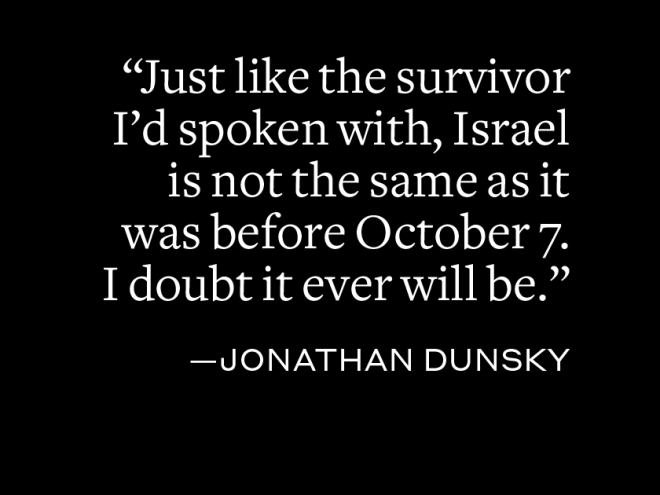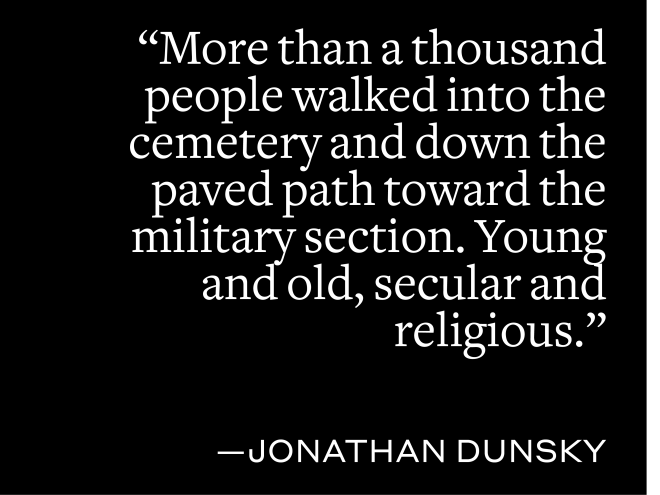
This piece is one of an ongoing series that we will be sharing in the coming days from Israeli authors and authors in Israel.
It is critical to understand history not just through the books that will be written later, but also through the first-hand testimonies and real-time accounting of events as they occur. At Jewish Book Council, we understand the value of these written testimonials and of sharing these individual experiences. It’s more important now than ever to give space to these voices and narratives.
In collaboration with the Jewish Book Council, JBI is recording writers’ first-hand accounts, as shared with and published by JBC, to increase the accessibility of these accounts for individuals who are blind, have low vision or are print disabled.
On the morning of Saturday, October 7, 2023, my mother called. This is ordinary; she calls every Saturday to see if she and my father can come over to see their grandchildren.
Only this time she told me outright that of course they would not be coming. When I asked her why, she was surprised. “Haven’t you been watching the news?” she asked. “There’s a war on.”
In the next few hours, the picture of the catastrophe began to take shape. A horde of Hamas terrorists had breached the border fence with Gaza, invaded nearby towns and kibbutzim, slaughtering nearly everyone in their path and abducting others to Gaza.
The Israeli Defense Forces were caught completely by surprise. The citizens of Israel had to fend for themselves. Some tried to escape and were gunned down. Others hid in safe rooms in their homes, made urgent calls for help, whispering into their phones in hopes that the terrorists would not hear them. Those safe rooms had been made to withstand rocket fire; they were not meant to keep out the wolf at the door.
The Hamas invaders were indiscriminate in their killing. Men, women, and children — all viewed by Hamas as fit for murder because of their Judaism — were put to death. The terrorists walked from house to house, ready to kill or abduct. Sometimes entire families were slaughtered. Sometimes, parents were killed in front of their children, who were then kidnapped; sometimes, it was the other way around.
And there was the music festival near kibbutz Re’im. Thousands of people arrived to dance and have fun.
And then the terrorists came.
Videos of the onslaught show unarmed Jews fleeing for their lives as Hamas gunmen fire into the crowd. Some managed to escape. Others hid for hours in bushes. And some played dead and were spared.
But many were dead for real. Over 250 people were murdered. A reporter who spoke to first responders and those hardy souls who came later to remove the bodies relayed their impressions: This was not a war. This was a scene reminiscent of Babi Yar, of the SS death squads of World War II. And the scenes of wanton slaughter in the kibbutzim brought to mind the old pogroms of Eastern Europe.
These were scenes that should not have been repeated in Israel. But they were. And the terror they instilled was of an ancient Jewish fear that reaches back generations and across continents. That of the defenseless Jew, at the mercy of his enemies. In that respect, Hamas had scored a victory.
Hamas took joy in their slaughter. They sought to commemorate it. To capture it for all eternity. Videos of mutilated bodies, of horrified hostages being dragged into Gaza, and of abuse heaped upon the captured in violation of all the rules of war and humanity began flying across the internet. Reports and footage suggest this abuse included the rape of female captives.
The killing did not spare non-Jewish citizens of Israel. Some died from rockets fired from Gaza; others were murdered by Hamas terrorists, likely because they believed them to be Jewish.
But there were also scenes of bravery and ingenuity. There was Ret. General Yair Golan, former Deputy Chief of Staff of the IDF. Golan, sixty-one years old, put on uniform and went into the terrorist-infested area near the border, evacuating those who managed to remain hidden.
There was Inbal Rabin-Lieberman, who serves as Head of Security for kibbutz Nir Am, where she lives. Rabin-Lieberman understood immediately the nature of the danger hurtling toward her kibbutz. She hastily put into action a plan of defense, arranging her security team — made up of civilian residents of Nir Am — into their positions at the fence of the kibbutz. When the terrorists came, the security team was ready. They killed twenty-five attackers, and Nir Am was spared.
And there was Rachel Edri in Ofakim, a city in the south of Israel. Five terrorists had invaded her home, taking her and her husband hostage. Edri managed to calm the terrorists by offering them coffee and cookies, and even bandaging one of them. She managed to keep her husband and herself alive for hours until policemen rescued them, killing the terrorists.
As the hours and days passed, Israeli troops converged on the beleaguered towns and kibbutzim, fighting at close range against the terrorists, slowly regaining lost ground and discovering more lost lives. And the Israeli Air Force began bombarding Gaza, probably in preparation of a wide-scale ground assault.
Israel is fighting back, but the picture is grim. Over one thousand Israelis are dead. Thousands more are wounded. Over one hundred are held hostage in Gaza, their condition unknown. And there is fear that the violence will spread to other fronts. Yesterday, a number of terrorists infiltrated Israel from Lebanon. They were stopped, but it’s an ominous sign of what may come. In Lebanon, Hezbollah is waiting in the wings, weighing its options. If it joins the fight, this war will be many times as bloody — for Israelis and their neighbors alike. This seems to be why President Biden has decided to send US Navy ships close to Israel, in an attempt to deter Hezbollah and others from initiating further attacks.
Israel changed on October 7. It will not be the same henceforth. The nature of this change is yet unclear. For now, the war is still waging. It is nowhere near over. Israelis expect a decisive victory. They will not be satisfied with anything less. After the Holocaust, Jews worldwide have made a solemn oath — Never Again. Now it’s time for the Jewish state to show that these are not empty words.
The views and opinions expressed above are those of the author, based on their observations and experiences.
Support the work of Jewish Book Council and become a member today.
Jonathan Dunsky is the author of the Adam Lapid historical mysteries series and the standalone thriller The Payback Girl. Before turning to writing, Jonathan served for four years in the Israeli Defense Forces and worked in the high-tech and Internet industries. He resides in Israel with his wife and two sons.



